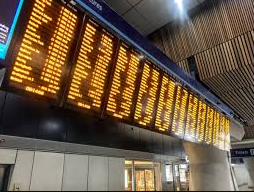
Commuters face severe delays and cancellations with multiple train operators hit by Aslef’s walkout
Commuters in London and across the UK are bracing for a major disruption on Tuesday as train services are set to be severely impacted by a large-scale strike. The walkout, organised by the Associated Society of Locomotive Engineers and Firemen (Aslef) union, will affect six major train operating companies, causing widespread travel chaos.
The affected services include Gatwick Express, Great Northern, South Western Railway, Southeastern, Southern, and Thameslink, with most lines offering only very limited services. Some train operators, such as Southern, Gatwick Express, and Thameslink, will have no services running at all, except for a few restricted shuttle routes.
South Western Railway will provide limited services between Waterloo and Basingstoke, as well as to Feltham, Guildford, and Woking between 7 am and 7 pm. However, most other services will not be operational. Passengers are strongly advised to only travel if absolutely necessary and to check their entire journey before setting out, as other train companies may also be affected by the disruption.
In addition to Tuesday’s strike, the Aslef walkout is part of a rolling series of strikes planned for the upcoming days, with further disruption expected on Wednesday, Friday, and Saturday. Northern Trains and TPE will be affected on Wednesday, while Greater Anglia and C2C will face walkouts on Friday. West Midlands Trains, Avanti West Coast, and East Midlands Railway will be impacted on Saturday.
The ongoing strikes are part of a broader dispute between the union and the Government over pay and conditions. Aslef General Secretary Mick Whelan criticised the Government for failing to engage in meaningful talks, pointing out that many of their members have not seen a pay increase in five years, despite rising inflation and living costs.
In response, the Rail Delivery Group, representing the train operators, urged the union to work with them to find a fair resolution, stressing the importance of resolving the dispute to improve service reliability.
The strikes also mark the first significant test of the new minimum service levels legislation, which is intended to ensure that 40% of services can still run during industrial action. However, none of the train operators are using this legislation to maintain services during the walkout.
The Prime Minister’s spokesperson expressed disappointment that train companies were not using the minimum service levels law, stating that the public expected all available powers to be used to minimise disruption.











